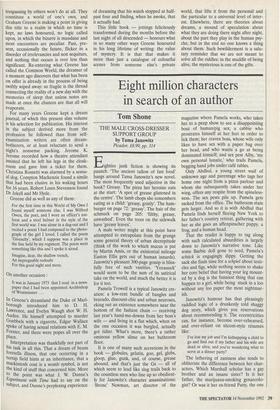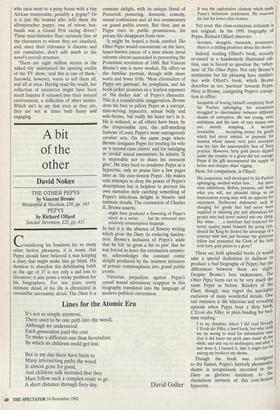Eight million characters in search of an author
Tom Shone
THE MALE CROSS-DRESSER SUPPORT GROUP by Tama Janowitz Picador, £8.99, pp. 314 Eighties junk fiction is showing its paunch. 'The ancient tallow of fast food' hangs around Tama Janowitz's new novel. The most frequently used adjective in the book? Greasy. The pizza her heroine eats at the start: 'A spot of grease glistened in the centre'. The lamb chops she remembers eating as a child: 'greasy, gristly'. The ham- burger on page 72: 'greasy'. The hair of the schmuck on page 205: 'filthy, greasy, unwashed'. Even the trees on the sidewalk have 'greasy leaves'.
A male writer might at this point have attempted to extrapolate from the grunge some general theory of urban decrepitude (think of the work to which mucus is put by Martin Amis, or the existential mileage Easton Ellis gets out of human innards). Janowitz's pleasant 300-page gossip is bliss- fully free of such vanities. `Yeeauuck' would seem to be the sum of its satirical take on the world, and much the better it is for it too.
Pamela Trowell is a typical Janowitz cre- ation: a low-rent bundle of bangles and bravado, discount-chic and urban neuroses, eking out an existence somewhere near the bottom of the fashion chain — receiving last year's hand-me-downs from her boss's wife — and living in a flat which, when on the one occasion it was burgled, actually got tidier. What's more, there's a rather ominous yellow slime on her bathroom floor.
It is one of many such accretions in the book — globules, gelatin, goo, gel, globs, gloop, glue, gunk, and, of course, grease abound, and that's just the Gs — all of which seem to lead like slug trails back to the countless men who line up so obedient- ly for Janowitz's character assassinations: `Bronc' Newman, art director of the magazine where Pamela works, who takes her to a peep show to see a disappointing bout of human/pig sex; a cabbie who prostrates himself at her feet in order to lick them; her craven boss, whose wife only likes to have sex with a paper bag over her head, and who wants a go at being dominated himself; and sex pest Alby, 'my own personal lunatic,' who trails Pamela, begging hand jobs under café tables.
Only Abdhul, a young street waif of unknown age and parentage who tags her home one night from a pizza parlour and whom she subsequently takes under her wing, offers any respite from the spineless- ness. The sex pests pile up. Pamela gets sacked from the office. The bathroom stain gets larger. And so it is with Abdhul that Pamela finds herself fleeing New York to her father's country retreat, gathering with her as she goes an affenpinscher puppy, a frog, and a human head. That the reader is happy to tag along with such calculated absurdities is largely down to Janowitz's narrative tone. Like some Barbie doll gone to seed, Pamela's schtick is engagingly dippy. Getting the sack she finds time for a schpiel about testi- cles and figs, while nothing seems to shake her core belief that having your leg mount- ed by a dog is the funniest thing that can happen to a girl, while being stuck in a loo without any loo paper the most nightmar- ish.
Janowitz's humour has that pleasingly raddled logic of a drunkenly told shaggy dog story, which gives you reservations about recommending it. The eccentricities can, for instance, become over-rehearsed, and over-reliant on sitcom-style résumés like:
I've lost my job and I'm kidnapping a child to go and find out if my father and his wife are dead or alive, and you're wondering what to serve at a dinner party?
The lathering of zaniness also tends to obliterate the difference between her char- acters. Which Marshall scholar has a gay brother and an insane sister? Is it her father, the marijuana-smoking gynaecolo- gist? Or was it her ex-friend Patty, the one who once went to a peep house with a tiny African transvestite, possibly a pygmy? Or is it just the woman who sells them the affenpinscher puppy, one of whose hus- bands was a Grand Prix racing driver? These mini-histories float curiously free of the characters to whom they are attached, and, since their relevance is discrete and not cumulative, don't add much to the novel's overall structure.
`There are eight million stories in the naked city' maintained the opening credits of the TV show, 'and this is one of them.' Janowitz, however, wants to tell them all, and all at once. Having read the result, her collection of eccentrics might have been much happier if released into their natural environment, a collection of short stories. Which isn't to say that even as they are, they are not at times both funny and engaging.



































































 Previous page
Previous page